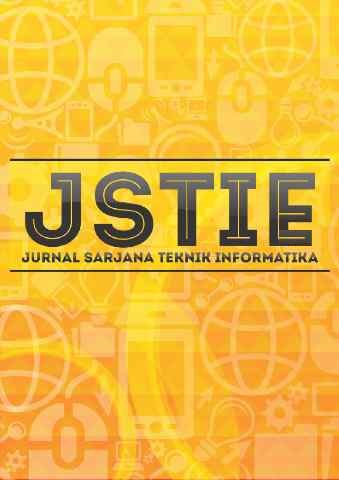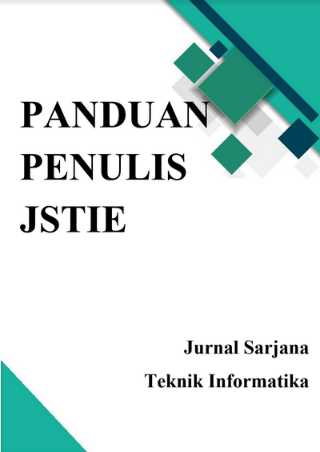Analisis Sentimen Masyarakat Terhadap Kebijakan Kominfo Tentang Penyelenggara Sistem Elektronik (PSE) Menggunakan Metode Naive Bayes
DOI:
https://doi.org/10.12928/jstie.v10i3.25327Keywords:
Machine Learning, Analisis Sentimen, Naïve Bayes, TwitterAbstract
Kementerian Komunikasi dan Informatika (Kominfo) membuat aturan baru, yaitu untuk setiap platform, aplikasi, dan web yang termasuk ke dalam Penyelenggara Sistem Elektronik (PSE) wajib untuk mendaftarkan diri kepada Kominfo menghindari pemblokiran. Pada tanggal 30 juli 2022 memblokir beberapa situs yaitu origin, paypal, steam dan lain-lain menjadi perbicangan di media sosial twitter menggunakan #BlokirKominfo untuk mengungkapkan berbagai opini dan keluh kesahnya. Pengumpulan data tweet tanggal 16 juli 2022- 06 Agustus 2022, data tweet diambil sebanyak 1500 data dengan tweet berbahasa Indonesia. Penelitian ini menggunakan metode klasifikasi Naïve Bayes. Naive Bayes Merupakan salah satu algoritma machine learning yang penggunaannya mudah serta pemrosesannya memiliki waktu yang cepat dan mudah diimplementasikan. Berdasarkan hasil penelitian yang telah dilakukan menggunakan data tweet PSE menunjukan bahwa sentimen dari data tweet tersebut cenderung negatif, tweet yang mengandung sentimen negatif ada sebanyak 606 data, tweet sentimen positif ada 378 data dan sentimen netral sebanyak 213 data. Proses klasifikasi pada penelitian ini menggunakan 20% data testing dan 80% data training. Pengujian menggunakan confusion matrixakurasi sebesar 63%, precision 80%, recall 46% dan F-score 44%.
References
Kominfo, “Sejarah Kominfo,” 2022. [Online]. Available: https://www.kominfo.go.id/profil.
LinovHR, “Mengenal PSE Kominfo dari Pro Kontra Hingga Siapa Saja yang Terdaftar,” LinovHR, 2022. [Online]. Available: https://www.linovhr.com/mengenal-pse-kominfo-adalah/. [Accessed: 18-Aug-2022].
F. C. Pradipha and O. W. Widayanti, “Alasan Kominfo Blokir Steam, Epic Games, Dota dan Beberapa Aplikasi Lainnya,” Tribunnews.com, 2022. [Online]. Available: https://www.tribunnews.com/nasional/2022/07/30/alasan-kominfo-blokir-steam-epic-games-dota-dan-beberapa-aplikasi-lainnya.
A. Brilliana, “Trending! Tagar Blokir Kominfo Trending di Twitter Setelah Memblokir Situs,” bekasiurbanjabar.com, 2022. [Online]. Available: https://bekasi.urbanjabar.com/news/pr-3114016802/trending-tagar-blokir-kominfo-trending-di-twitter-setelah-memblokir-situs#. [Accessed: 15-Aug-2022].
I. N. Jelita, “PayPal Diblokir, Hambat Aktivitas Pekerja,” 2022. [Online]. Available: https://mediaindonesia.com/ekonomi/511149/paypal-diblokir-hambat-aktivitas-pekerja. [Accessed: 20-Aug-2022].
S. Suryono, E. Utami, and E. T. Luthfi, “Analisis Sentiment Pada Twitter Dengan Menggunakan Metode Naive Bayes Classifer,” pp. 9–15, 2018.
N. P. G. Naraswati, R. Nooraeni, D. C. Rosmilda, D. Desinta, F. Khairi, and R. Damaiyanti, “Analisis Sentimen Publik dari Twitter Tentang Kebijakan Penanganan Covid-19 di Indonesia dengan Naive Bayes Classification,” Sistemasi, vol. 10, no. 1, p. 222, 2021.
B. M. Pintoko and K. M. L., “Analisis Sentimen Jasa Transportasi Online pada Twitter Menggunakan Metode Naive Bayes Classifier,” e-Proceeding Eng., vol. 5, no. 3, pp. 8121–8130, 2018.
A. R. T. Lestari, R. S. Perdana, and M. A. Fauzi, “Analisis Sentimen Tentang Opini Film Pada Dokumen Twitter Berbahasa Indonesia Menggunakan Naive Bayes Dengan Perbaikan Kata Tidak Baku,” J. Pengemb. Teknol. Inf. dan Ilmu Komput., vol. 1, no. 12, pp. 1718–1724, 2017.
E. Fitri, “Analisis Sentimen Terhadap Aplikasi Ruangguru Menggunakan Algoritma Naive Bayes, Random Forest Dan Support Vector Machine,” J. Transform., vol. 18, no. 1, p. 71, 2020.
S. D. Pramukti, “Analisis Sentimen Masyarakat Dengan Metode Naïve Bayes dan Particle Swarm Optimization,” Techno.Com, vol. 21, no. 1, pp. 61–74, 2022.
V. A. Permadi, “Analisis Sentimen Menggunakan Algoritma Naive Bayes Terhadap Review Restoran di Singapura,” J. Buana Inform., vol. 11, no. 2, p. 140, 2020.
H. Tuhuteru and A. Iriani, “Analisis Sentimen Perusahaan Listrik Negara Cabang Ambon Menggunakan Metode Support Vector Machine dan Naive Bayes Classifier,” J. Inform. J. Pengemb. IT, vol. 3, no. 3, pp. 394–401, 2018.
D. Normawati and S. A. Prayogi, “Implementasi Naïve Bayes Classifier Dan Confusion Matrix Pada Analisis Sentimen Berbasis Teks Pada Twitter,” J. Sains Komput. Inform., vol. 5, no. 2, pp. 697–711, 2021.
T. Krisdiyanto, “Analisis Sentimen Opini Masyarakat Indonesia Terhadap Kebijakan PPKM pada Media Sosial Twitter Menggunakan Naïve Bayes Clasifiers,” J. CoreIT J. Has. Penelit. Ilmu Komput. dan Teknol. Inf., vol. 7, no. 1, p. 32, 2021.
D. Putra and A. Wibowo, “Prediksi Keputusan Minat Penjurusan Siswa SMA Yadika 5 Menggunakan Algoritma Naïve Bayes,” Pros. Semin. Nas. Ris. Dan Inf. Sci., vol. 2, pp. 84–92, 2020.
S. Panchal, “Sentiment Analysis with VADER- Label the Unlabelled Data,” 2020. [Online]. Available: Sentiment Analysis with VADER- Label the Unlabelled Data.
S. Informatika and J. Komputer, “Perbandingan algoritma dalam analisa sentimen krisis evergrande pada kanal berita youtube,” vol. 11, no. 2, pp. 72–76, 2021.
Downloads
Published
Issue
Section
License
License and Copyright Agreement
In submitting the manuscript to the journal, the authors certify that:
- They are authorized by their co-authors to enter into these arrangements.
- The work described has not been formally published before, except in the form of an abstract or as part of a published lecture, review, thesis, or overlay journal. Please also carefully read Journal Posting Your Article Policy.
- The work is not under consideration for publication elsewhere.
- The work has been approved by all the author(s) and by the responsible authorities – tacitly or explicitly – of the institutes where the work has been carried out.
- They secure the right to reproduce any material that has already been published or copyrighted elsewhere.
- They agree to the following license and copyright agreement.
Copyright
Authors who publish with Jurnal Sarjana Teknik Informatika agree to the following terms:
- Authors retain copyright and grant the journal right of first publication with the work simultaneously licensed under a Creative Commons Attribution License (CC BY-SA 4.0) that allows others to share the work with an acknowledgement of the work's authorship and initial publication in this journal.
- Authors are able to enter into separate, additional contractual arrangements for the non-exclusive distribution of the journal's published version of the work (e.g., post it to an institutional repository or publish it in a book), with an acknowledgement of its initial publication in this journal.
- Authors are permitted and encouraged to post their work online (e.g., in institutional repositories or on their website) prior to and during the submission process, as it can lead to productive exchanges, as well as earlier and greater citation of published work.








